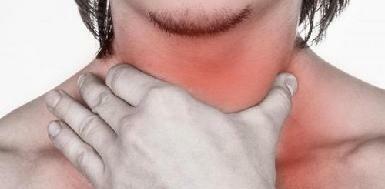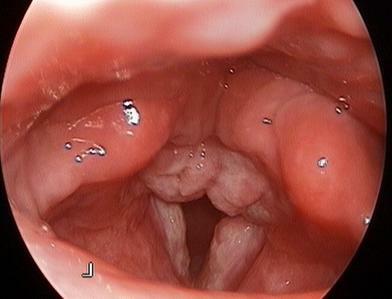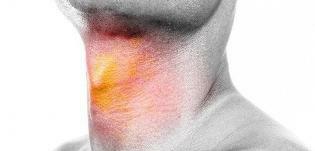 Laryngitis is the acute or chronic inflammation of the larynx. In the pathological process can be involved as the entire mucous membrane of the larynx( diffuse form of laryngitis), and its individual parts - the mucosa of the epiglottis, vocal folds or walls of the podogolosovoy cavity.
Laryngitis is the acute or chronic inflammation of the larynx. In the pathological process can be involved as the entire mucous membrane of the larynx( diffuse form of laryngitis), and its individual parts - the mucosa of the epiglottis, vocal folds or walls of the podogolosovoy cavity.
Laryngitis is most commonly diagnosed in children and adolescents, but an adult can also develop inflammation. The defeat of the throat is accompanied by swelling and inflammation of the vocal cords, resulting in the patient experiencing symptoms such as hoarseness or complete loss of voice.
In this case, laryngitis can occur in acute or chronic form, so the symptoms and treatment methods will also vary. Especially dangerous is acute stenosing laryngotracheitis( false groats) in children, because due to the smaller size of the larynx, there is a danger of severe narrowing of the glottis and a threat of stopping breathing, which without timely medical assistance can lead to the death of the child.
Laryngitis in children
Parents should understand what is laryngitis in children. It is an inflammation of the larynx of the baby's larynx and vocal cords. Such a disease is quite typical for children. Its appearance testifies to the reaction of a fragile organism to viral diseases.
Influenza, ARVI, signs of adenovirus infection very often lead to inflammation of the vocal cords and larynx. The smaller the child, the more serious the course of the disease. Children under 3 years of age have a likelihood of narrowing the lumen in the larynx. Such a state is a serious threat to the life of a crumb.
False groats
In children up to 6-8 years of age, a special form of acute laryngitis may develop, namely the occurrence of a false groin. Its manifestations are similar to manifestations of diphtheria of the larynx - the true croup.
This complication is dangerous because it can lead to severe breathing difficulties due to narrowing of the laryngeal lumen due to the inflammatory process( edema), which, in turn, is often combined with a spasm of the glottis. False groats with acute laryngitis are most often observed in children with exudative diathesis.
In case of false rupture, an attack of a disease occurs usually unexpectedly, at night during sleep: the child suddenly wakes up all in sweat, is restless, his breathing becomes more and more difficult and noisy, his lips turn blue, coughing "barking".After a while( 20-30 minutes) the child calms down and falls asleep. The body temperature during the attack remains normal or slightly increases. Seizures can be repeated this or next night. If signs of false croup appear, you should immediately call an ambulance or take the child to a nearby hospital.
Treatment of laryngitis in children: Dr. Komarovsky
Only qualified specialists have the right to diagnose and prescribe the treatment of laryngitis in children. Therefore, if the child has started stenosing cough, the temperature has risen or there is the slightest suspicion of the development of the disease, it is urgent to take the baby to the hospital. The doctor will examine the child, make a general blood test, determine the severity of the disease and, based on this, prescribe an effective treatment.
For more detailed acquaintance with the disease, we offer to watch a video with the famous pediatrician Komarovsky.
Reasons for
Why does laryngitis occur, and what is it? The causes of laryngitis can be completely different. As a rule, it is directly related to the body's hypothermia or general immunity, accompanied by a virus attack. There may be a mechanical cause of the disease - for example, a burn or injury.
There are factors that are directly related to the appearance of the disease, they can be attributed to the most common - dustiness of the room, various inflammatory processes inside the body, excessive timbre of the voice and, of course, violations in the airways.
Classify inflammation of the larynx according to the following forms:
- The catarrhal form of belongs to the most harmless variety of laryngitis and is most common in children - it occurs with symptoms typical of most respiratory infections:
- The diphtheria form of - this variant is accompanied by the transition of the infection process from the tonsils to the larynx.
- Hemorrhagic form of - for it a characteristic feature is hemorrhage in laryngeal ligaments and its mucous membrane. This form develops only in the presence of predisposing factors.
- Hypertrophic form of - often happens in children, with it there is hyperplasia and proliferation of the laryngeal mucosa.
- Laryngotracheitis or lumbar lining is a form of the disease in which the initial parts of the trachea are involved in the inflammatory process.
- Phlegmonous laryngitis is extremely rare, it develops against a background of reduced immunity, after trauma or the transfer of severe infectious diseases.
- Atrophic form of - as a rule, children do not exist, with this form there is thinning of the laryngeal mucosa.
As for the chronic course of the disease, then, as in all other cases, this may be due to the lack of treatment of diseases such as ARVI or a frequent illness. Also, one should not forget about allergic reactions of the body. In the risk zone can be attributed and harmful work in chemical plants.

Symptoms of laryngitis
When laryngitis occurs, the symptoms in adults largely depend on the form of the disease( see photo).In the acute stage, the symptomatology may include signs of acute respiratory disease, appears:
- dryness and sore throat;
- pain when swallowing;
- hoarseness or lack of voice;
- cough( first dry, then with sputum separation);
- increase in temperature( usually not higher than 37.5-38.0 °);
- weakness, headache.
A certain danger is atrophic laryngitis in adults: the symptoms of this disease are quite difficult to distinguish from the primary leukoplakia of the larynx, which is characteristic of the initial stage of the oncological process.
Even more difficult to diagnose is diphtheria laryngitis, which can lead to death of the patient due to the complete blocking of air access to the respiratory tract due to the formation of dense crusts.
With timely and adequate treatment of laryngitis in adults, recovery occurs in 7-10 days. With improper treatment or lack of it, complications can arise, the pathological process can go on into a chronic form that is characterized by persistent sore, scratching sensations in the throat, rapid fatigue of the vocal cords, and periodic exacerbations.
Chronic form
In adults, chronic laryngitis is determined by the following symptoms:
- hoarseness of voice;
- the patient quickly gets tired of the throat when talking;
- Perspiration in the throat is periodic;
- short, dry cough.
A constantly recurring acute process can make chronic laryngitis, as well as allergic reactions of a systematic nature. The intensity of symptoms depends on the duration of the inflammatory process in the throat, but the main symptom of chronic laryngitis is still a clear change in voice, its hoarseness and hoarseness.
Laryngitis: photo
We offer to view detailed photos to find out what laryngitis looks like in adults.

Diagnosis
Patient survey and patient examination are performed. On the basis of subjective complaints of the patient and the data of examination of the cervical lymph nodes and throat, the doctor establishes a diagnosis. In some cases it is necessary to perform laryngoscopy( examination of the larynx using a flexible endoscope tube).This method also makes it possible to take a tissue sample for biopsy, which makes it possible to exclude the presence of tumor processes.
A video laryngostroscope can also be performed, during which the doctor sees rapid vibrations of the vocal folds. If necessary, a general clinical blood test and other studies are performed.
Prevention
In order not to think how to treat laryngitis, one should adhere to simple prevention rules. This will help:
- Hardening of the body, starting from childhood.
- Timely treatment of cold infections and chronic bacterial foci.
- Observance of the regime( home mode, warm abundant drink, shaking of the voice - speak quietly or in a whisper, do not get nervous, do not walk, exclude physical activity).
- Combating bad habits( smoking, alcohol).
- I Do Sports.
Treatment of laryngitis in adults
When symptoms of laryngitis are detected, acute treatment consists primarily in eliminating the causes that caused the disease( most often influenza or colds).For complete resting of the larynx within 5 days, the patient is not recommended to talk, if necessary, speak in a low whisper.
The general scheme of treatment is as follows:
- elimination of possible causes - reduced loads on the larynx and vocal cords( silence);
- exclusion of food irritating mucous - carbonated drinks, salty, spicy dishes;
- full refusal from smoking, reception of alcoholic drinks, including beer, alcoholic cocktails;
- abundant warm drink - teas, infusions, decoctions, milk, jelly, juices.
Adults with acute laryngitis may be prescribed certain drugs :
- Local drugs containing antimicrobial and anti-inflammatory substances( Kampomene, Ingalipt, Tera-flu).
- Expectorants based on mucaltin or carbocysteine.
- With excruciating dry cough - antitussives with codeine( Cofex) or butamate( Sinekod).
- With a pronounced edema of the larynx - antihistamines( Cetirizin, Loratadin).
- If suspected of the bacterial nature of the disease, a drug containing an antibiotic may be used.
- In a subacute stage of laryngitis, physiotherapy( electrophoresis with novocaine, UHF) is used.
In the treatment of exacerbations of chronic laryngitis, special attention should be paid to the therapy of chronic infections that contribute to this exacerbation.

How to treat laryngitis at home
At home, laryngitis treatment includes:
- voice mode( it is recommended that the patient be silent or speak in a low whisper for 1 week);
- calm state, reducing the likelihood of spasm, positive impressions, movies and music;
- a warm drink - not abundant, but frequent( Borjomi, milk with honey);
- fresh air for breathing( the patient himself is recommended to wrap up);
- humidification of air( using wet towels, containers with water);
- diet with the exception of cold, hot, spicy and salty foods;
- steam inhalation over a pan with the addition of iodine, eucalyptus leaves, menthol or anise oil;
- warm compresses on the neck, rinse throat with sage and chamomile;
- hot foot bath;
- antihistamines;
- adults - to exclude smoking and reception of alcoholic drinks.
Sometimes even some of these measures can improve the condition and even suppress edema. But in a number of cases, drug therapy is needed in a hospital.
Than to gargle with laryngitis
The simplest and most popular way is rinsing with a soda solution: 1 teaspoon of soda drinking diluted in 1 glass of warm water, rinse with soda solution is shown 5-7 times a day. Soda can be replaced with sea salt.
You can also use carrot milk for rinses: boil 100 g of carrots in 0,5 l of milk, strain and regularly rinse with this liquid throat. To this end, also used beet juice and potatoes, diluted with warm water. Herbal decoctions( ayr, nettle, sage, chamomile) will also be useful.
Inhalation with laryngitis nebulizer
Inhalation with laryngitis is extremely effective and absolutely harmless. An indispensable tool that can alleviate the attack of suffocating cough with laryngitis, are nebulizer inhalations. The principle of the nebulizer inhaler is a very fine crushing and spraying of the drug solution.
A solution is placed in the nebulizer, which contains special medications for inhalation. The device sprays the solution into small particles, they quickly penetrate into the depths of the respiratory system, without causing irritation and spasm.
As for solutions for steam inhalations, they can be used only in the absence of allergy to the components of these solutions:
- infusions of herbs - calendula, mint, mother and stepmother, pine buds, chamomile, sage.
- can be inhaled by adding a few drops of 2-3 essential oils - juniper, tea tree, eucalyptus, cedar, oil of thuja( with adenoids).
- saline solution - 3 tablespoons sea salt + 3 teaspoon baking soda for 1 liter, 5-6 drops of iodine.
If the doctor has prescribed several drugs for inhalation, there is a rule: the first are bronchodilators, after 15 minutes.expectorants.

Antibiotic for laryngitis for adults
Antibiotic drugs are needed only if it is necessary. Modern antibiotics can easily cope with the majority of bacteria causing various diseases, including laryngitis. However, bacteria are not the only cause of laryngitis.
And if there is a question, whether it is necessary to take an antibiotic, first of all it is necessary to proceed from the cause of the disease. Dozens of reasons can cause laryngitis, whose treatment with antibiotics will not have any effect. For example: allergic laryngitis, laryngitis in case of burning with gastric juice, laryngitis from occupational hazards( smoke, dust, etc.), laryngitis as a result of vocal overexertion( screaming, singing, etc.), autoimmune laryngitis, fungal laryngitis, etc.
Antibiotics, which are most often used in the treatment of laryngitis:
- Penicillin series ( Amoxiclav, Flemoclav Solutab, Ecoclave suspension, Augmentin and others).
- Cephalosporins in the form of syrups( Cefix, Cefadox, Suprax), in the form of injections( Ceftriaxone, Fortum).
- With an especially severe degree of laryngitis, macrolides , azithromycin -( Sumamed, Zetamax retard, Hemomycin, Azitrox, Ecomed), Macropen, Claritomycin are prescribed.
If you do not want to harm yourself and especially your child, the appointment of antibiotics should be performed only by the attending physician and after a series of additional studies.

How to choose probiotics for the intestines: a list of drugs.

Effective and inexpensive cough syrups for children and adults.

Modern non-steroidal anti-inflammatory drugs.

Review of tablets from the increased pressure of the new generation.
 Antiviral drugs are inexpensive and effective.
Antiviral drugs are inexpensive and effective.


